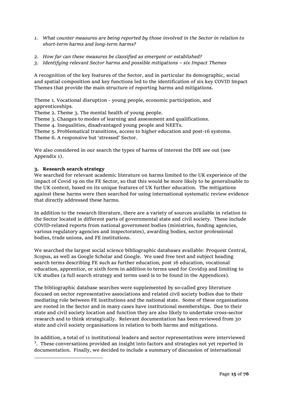
Page 15 of 76
1. What counter measures are being reported by those involved in the Sector in relation to
short-term harms and long-term harms?
2. How far can these measures be classified as emergent or established?
3. Identifying relevant Sector harms and possible mitigations - six Impact Themes
A recognition of the key features of the Sector, and in particular its demographic, social
and spatial composition and key functions led to the identification of six key COVID Impact
Themes that provide the main structure of reporting harms and mitigations.
Theme 1. Vocational disruption - young people, economic participation, and
apprenticeships.
Theme 2. Theme 3. The mental health of young people.
Theme 3. Changes to modes of learning and assessment and qualifications.
Theme 4. Inequalities, disadvantaged young people and NEETs.
Theme 5. Problematical transitions, access to higher education and post-16 systems.
Theme 6. A responsive but 'stressed' Sector.
We also considered in our search the types of harms of interest the DfE see out (see
Appendix 1).
3. Research search strategy
We searched for relevant academic literature on harms limited to the UK experience of the
impact of Covid 19 on the FE Sector, so that this would be more likely to be generalisable to
the UK context, based on its unique features of UK further education. The mitigations
against these harms were then searched for using international systematic review evidence
that directly addressed these harms.
In addition to the research literature, there are a variety of sources available in relation to
the Sector located in different parts of governmental state and civil society. These include
COVID-related reports from national government bodies (ministries, funding agencies,
various regulatory agencies and inspectorates), awarding bodies, sector professional
bodies, trade unions, and FE institutions.
We searched the largest social science bibliographic databases available: Proquest Central,
Scopus, as well as Google Scholar and Google. We used free text and subject heading
search terms describing FE such as further education, post 16 education, vocational
education, apprentice, or sixth form in addition to terms used for Covid19 and limiting to
UK studies (a full search strategy and terms used is to be found in the Appendices).
The bibliographic database searches were supplemented by so-called grey literature
focused on sector representative associations and related civil society bodies due to their
mediating role between FE institutions and the national state. Some of these organisations
are rooted in the Sector and in many cases have institutional memberships. Due to their
state and civil society location and function they are also likely to undertake cross-sector
research and to think strategically. Relevant documentation has been reviewed from 30
state and civil society organisations in relation to both harms and mitigations.
In addition, a total of 11 institutional leaders and sector representatives were interviewed
3
. These conversations provided an insight into factors and strategies not yet reported in
documentation. Finally, we decided to include a summary of discussion of international